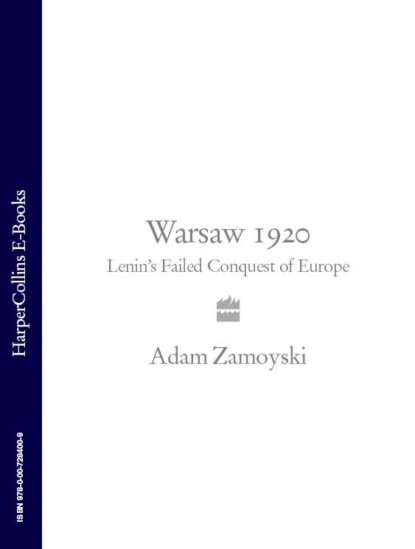По всем вопросам обращайтесь на: info@litportal.ru
(©) 2003-2024.
✖
Warsaw 1920: Lenin’s Failed Conquest of Europe
Настройки чтения
Размер шрифта
Высота строк
Поля
A Russian divisional radio transmitter. (The David King Archive, London)
Zeligowski. (Centralne Archiwum Wojskowe, Warsaw)
Yakir. (The David King Archive, London)
Uborevich. (The David King Archive, London)
Sosnkowski. (The Józef Pilsudski Institute, London)
A Russian armoured car captured by the Poles in the Kiev offensive.
(Centralne Archiwum Wojskowe, Warsaw)
Smigly-Rydz taking the salute as Polish troops march into Kiev, 7 May 1920. (The Józef Pilsudski Institute, London)
Smigly-Rydz greeting the Ukrainian leader Ataman Symon Petlura in Kiev. (Centralne Archiwum Wojskowe, Warsaw)
Recruits of the Ukrainian National Army parade before Petlura.
(Centralne Archiwum Wojskowe, Warsaw)
Lenin calling for volunteers to fight Poland, May 1920. (The David King Archive, London)
Tukhachevsky. (The David King Archive, London)
Szeptycki. (The Józef Pilsudski Institute, London)
Stalin. (The David King Archive, London)
Yegorov. (The David King Archive, London)
Budionny and Voroshilov. (The David King Archive, London)
Gai. (The David King Archive, London)
Units of the Polish First Army in retreat, early August 1920. (The Józef Pilsudski Institute, London)
The PolRevKom, Lenin’s government for Poland. (Centralne Archiwum Wojskowe, Warsaw)
Soldiers of Budionny’s Konarmia, July 1920. (The David King Archive, London)
Officers of the French military mission to Poland. (Centralne Archiwum Wojskowe, Warsaw)
Haller. (The Józef Pilsudski Institute, London)
Iwaszkiewicz. (Centralne Archiwum Wojskowe, Warsaw)
A detachment of the Women’s Volunteer Legion, August 1920.
(Centralne Archiwum Wojskowe, Warsaw)
Sikorski. (Centralne Archiwum Wojskowe, Warsaw)
Polish machine-gun emplacement outside Warsaw, August 1920.
(Centralne Archiwum Wojskowe, Warsaw)
Polish tanks at Minsk Mazowiecki, August 1920. (Centralne Archiwum Wojskowe, Warsaw)
Polish infantry advancing outside Warsaw. (Centralne Archiwum Wojskowe, Warsaw)
Pilsudski. (Centralne Archiwum Wojskowe, Warsaw)
Men of Gai’s KonKorpus being disarmed by German lancers.
(Centralne Archiwum Wojskowe, Warsaw)
MAPS
Europe after the Paris peace settlement (#ulink_b290f90e-e85d-5d2d-8271-284ce29c6942)
The Kiev offensive and the battle of the Berezina (#litres_trial_promo)
The Kiev débâcle (#litres_trial_promo)
Tukhachevsky’s march on Europe (#litres_trial_promo)
The battle for Brody (#litres_trial_promo)
The Polish regrouping operation (#litres_trial_promo)
The battle for Warsaw, 14 August (#litres_trial_promo)
The battle for Warsaw, 15–16 August (#litres_trial_promo)
The counterstroke, 16–22 August (#litres_trial_promo)
Budionny’s last battle (#litres_trial_promo)
Last stand on the Niemen (#litres_trial_promo)
INTRODUCTION
It may come as something of a surprise to most people that a battle as decisive as Marathon or Waterloo took place in Europe between the end of the First World War in 1918 and the outbreak of the Second in 1939. Dramatic and fateful as they were, the events that took place at the gates of Warsaw in August 1920 have sunk into oblivion.
This is the more surprising as they had a profound effect on the politics of the 1920s and 1930s, on the course of the Second World War, and on the peace settlement of 1945, as well as a lasting one on attitudes throughout Europe — figures such as Stalin, Churchill and De Gaulle were personally involved, while others such as Mussolini, Franco and Hitler took careful note.
The reasons for this eclipse are not hard to find. One is that while the battle did indeed alter the course of history, it did so by preventing something from taking place rather than by reversing it; this meant that it had no palpable impact on anyone not directly involved. Another is that historians of the time were mostly preoccupied with other themes, such as composing triumphalist accounts of the Great War from their own national standpoint. If they mentioned the battle of Warsaw at all, they tended to follow the lead of Soviet historians, who, not wishing to accept that their country had lost a war, treated it as part of the Russian Civil War, which the Soviets had won. Finally, the Second World War reversed the effect of the 1920 contest, seemingly rendering it irrelevant in the greater scheme of things. A negative view of Eastern Europe and the wholesale acceptance of socialist orthodoxies by Western historians in the decades following it did the rest.











